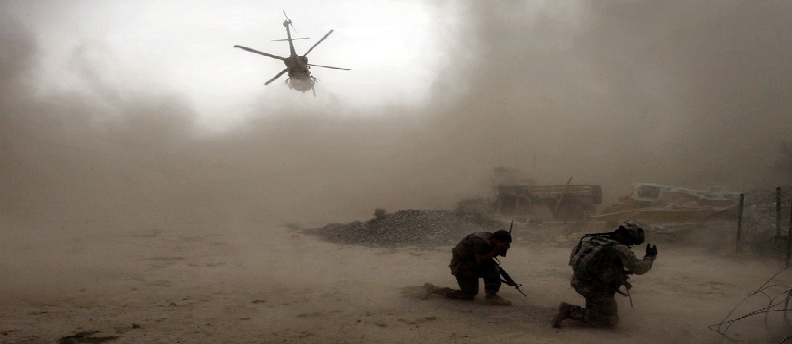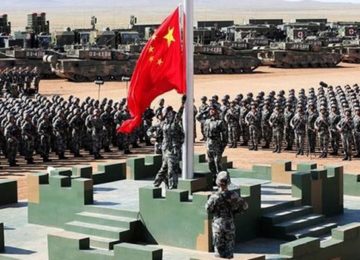America needs a real debate about its longest war.
The United States needs to confront the realities of the war in Afghanistan, and it needs to do it now.
Just a few weeks ago, President Donald Trump told the American people that he was committing the United States to an open-ended war in Afghanistan. Shortly thereafter, Secretary of Defense James Mattis announced the deployment of 3,500 more troops, which would bring the total to roughly 15,000.
The announcements barely registered on the national consciousness, and the country quickly moved on.
This collective national shrug was not a surprise. America’s longest war – 16 years and counting – has remained on the back burner for most Americans. Presidents and national leaders have repeatedly attempted to downplay the longevity of America’s commitment in Afghanistan, and the fewer American troops who are dying, the further Afghanistan has faded from the headlines.
The 16th anniversary of the 9/11 attacks and the unveiling of Trump’s Afghanistan policy should trigger a renewed national conversation about America’s role there.
In 2001, announcing the beginning of the war, President George W. Bush said, “We will not waver; we will not tire; we will not falter; and we will not fail. Peace and freedom will prevail.” But after toppling the Taliban, Bush quickly shifted America’s attention to an unnecessary war in Iraq, which sapped troops, resources and attention from Afghanistan.
In 2009, President Barack Obama surged forces into Afghanistan, while trying to maintain a time-limited commitment. Obama stated, “It must be clear that Afghans will have to take responsibility, and that America has no interest in fighting an endless war in Afghanistan.” Despite progress in degrading al-Qaida, at the end of Obama’s second term Afghanistan was a mess and almost 10,000 U.S. troops remained.
Enter Donald Trump. After repeatedly saying that the United States should leave Afghanistan, Trump announced in August 2017 “conditions on the ground … will guide our strategy from now on. America’s enemies must never … believe they can wait us out.” Trump is sending more troops in an open-ended commitment, and without a strategy for ending the war.
Today, the end seems no closer than it did during the Bush administration. Despite some gains, the Afghan government is weak. The Taliban controls large swathes of the country. The Islamic State group has a foothold in Afghanistan. And Pakistan continues supporting the Taliban.
The options have never been good. The United States could pack up and leave, though instability could accelerate and terrorists could once more have a safe haven, raising comparisons to Iraq, where the Islamic State group grew in the aftermath of a U.S. withdrawal. The United States could attempt an even smaller presence focused on counter-terrorism operations, but that is more difficult than it sounds, would not guarantee preserving the Afghan government, and would not be a long-term solution. The United States could yet again send more troops, as Trump is beginning to do, but which risks continuing the forever war.
To some, a permanent U.S. military presence is acceptable. In quiet, hushed conversations, policymakers and analysts admit that the United States may very well have a significant troop presence in Afghanistan for the foreseeable future. This belief more or less underlies the policy the United States has pursued over the last couple years.
But the country is not focused on this – except the brave men and women still fighting in Afghanistan, and the additional ones who will soon be fighting.
Afghanistan is unlike any foreign commitment the United States has ever experienced. The U.S. presence in Afghanistan is not a peacetime deployment in allied countries or one focused just on capacity building. This is a war with no end in sight. If America’s leaders strongly believe that U.S. national security requires thousands of troops deployed in Afghanistan for years to come, they need to say that to the American people in no uncertain terms, and begin a real national conversation about the merits of America’s longest war.
Since I’m encouraging an honest public debate, I’ll add my thoughts. I’m conflicted. My gut tells me that, recognizing the harsh realities, a long-term U.S. military effort will not make much of a difference. I believe that the United States cannot, and should not, have thousands of troops deployed to every failed state where terrorists roam (think Yemen, Somalia, Libya). I lean towards reducing the U.S. commitment as much as possible while focusing on counterterrorism, and investing real energy in a diplomatic effort including Russia, Iran and China.
That said, I recognize that Afghanistan could once again revert to a disastrous pre-9/11 state, and I’m willing to be convinced by responsible leaders if they can make the case as to what America’s realistic goals are and why a larger and longer-term commitment is necessary.
The lack of public attention is what makes Afghanistan a forever war for the United States. Until the nation engages in a robust and regular public debate with its leaders, it will be easy for politicians and generals to continue to deploy troops into active combat in Afghanistan without a strategy to win or come home.
This article originally appeared in U.S. News on September 14, 2017. Original link.








